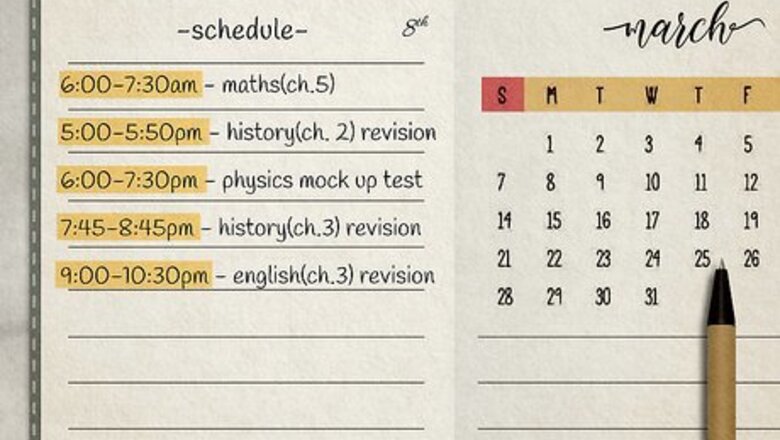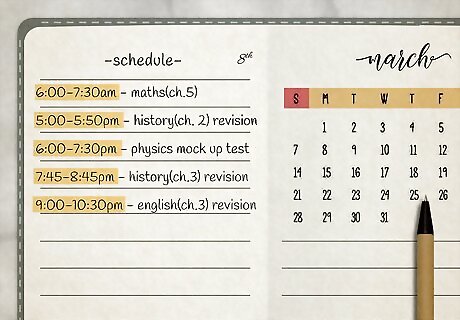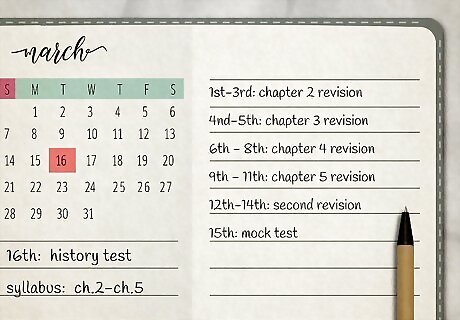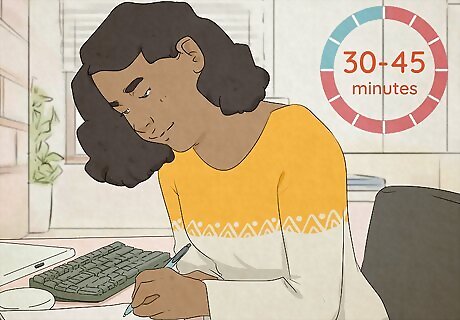
views
Make a study schedule.

Plan in advance for how to attack those major exams. Before you have a daily timetable, it would be great to set up a weekly calendar. Take a look at the syllabus and jot down dates of big tests like the mid-term and the final. In your planner, note that you should start preparing at least 2-3 weeks ahead of time. Make plans to meet with your study group and set aside time for extra study sessions during these weeks. If you plan for these sessions in advance, it won’t feel so stressful. You’ll still need to put in extra work, but you’ll be mentally prepared for it. Plan your study sessions at times that work best for you. For example, if you’re a morning person, review your notes and quiz yourself bright and early. If you focus better in the evenings, study after dinner.
Study a little bit each day.

Look at your notes frequently, not just right before a test. This is the best way to make sure you are prepared for an exam. Going over the information several days per week will help you retain it better than trying to cram it in right before a test. It will also help you retain the material longer. Make it a point to look at your notes most days of the week. You could review your notes right after class or right after you do your reading. You can also review them later in the day. Whatever works for you is fine.
Space out your study sessions.

Do a few hours a week rather than several hours right before a test. You might feel like you'll remember that material better if you've gone over it repeatedly in the days leading up to an exam, but that can actually be counterproductive. Research shows that spacing out your study sessions can help you better retain the information. This can also help you from feeling lots of nerves leading up to your test since you will have given yourself time to review everything.
Study in short bursts to avoid burnout.

Try to study in 30- to 45-minute blocks to retain the most information. Your brain needs a break after that. Plan to start by reviewing the material for 2-3 minutes, then focusing on the most difficult concepts for 30-45 minutes. Try setting a timer so that you don't have to keep an eye on the clock the whole time.
Take frequent breaks when you're studying.

Get up and move around for 10 minutes. Make it a point to take a break for at least 10 minutes every hour. Your brain needs a little time to refresh. Go outside for a short walk if you can, or do jumping jacks in your house. You could also put on one of your favorite songs for a dance break! Set a timer for your break so that you don't accidentally forget to get back to studying.
Set up a comfy study space.

Choose a spot where you won’t have too many distractions. Comfort and the ability to focus are key to a good study space. If you’re going to study at home, pick an area of the house where you won’t be interrupted by others. This might be your bedroom or the kitchen table when no one else is around. Make sure you have a cozy chair or spot on the floor where you can settle in for a while. If outside noises distract you, get a pair of good headphones. You can use them to play your own tunes or just to cancel out other sounds. You might also want to study outside of the house. A friendly coffee shop or the library are great options for study sessions.
Turn off social media and other distractions.

Silence your notifications so you can really focus. While it’s always tempting to check in with your friends, social media can be really distracting when you’re trying to retain information. If you use your laptop to study, log off of all social media sites. It’s okay to keep your phone nearby but turn off your social media notifications while you're hitting the books. It’s cool to take breaks while you study, but use them to stretch your legs or eat a snack. Try to stay off social media during your short breaks because you don’t want to accidentally go down a rabbit hole! Don't watch TV or try to chat with friends via text while you study. If you need some background noise, turn on some music that won't distract you.
Find some study buddies.

Working with others can make studying more fun. Social learning can make learning feel more like having a little bit of fun and help you stay on track. Start a study group with some other students in the class and make a plan to meet up regularly. That way you won’t have to worry about cramming before the exam. During your sessions you can share notes, quiz each other, and help each other go over the material. Social learning is great because it allows you to share ideas and information. Plan to meet with your study group about once a week for an hour or two.
Take good notes.
Taking notes helps you remember more and they're a great resource. You can take handwritten notes or type them out. Just make sure you can read them later! Great notes are also a solid resource when it's time to prep for a test. If your teacher took the time to say it and it sounded important enough to write down, chances are it's going to be on the next test.[Image:Study for a Test Without Cramming Step 9 Version 2.jpg|center]] Don’t try to write down every word the teacher says or rewrite every word from the book. Concentrate on writing down key terms and themes. Write down any questions that come to mind as you're taking notes. That way, you can look up the answers later.
Test yourself on the material.

Practice tests can help you figure out what you're struggling with. Practice tests that are in the same format as the actual test are the best options. If your teacher doesn't provide practice tests, check your textbook for practice questions (they're usually at the end of each chapter). If you have to, try creating your own practice tests. For example, if you know the test will be multiple-choice, use your textbook and class notes to write up several multiple-choice questions. This is a great strategy to try the week of the test. This is a great activity for a study group, but you can do it on your own, too. Set a timer to practice taking the test in the amount of time you’ll have on exam day. EXPERT TIP Joseph Meyer Joseph Meyer Math Teacher Joseph Meyer is a High School Math Teacher based in Pittsburgh, Pennsylvania. He is an educator at City Charter High School, where he has been teaching for over 7 years. Joseph is also the founder of Sandbox Math, an online learning community dedicated to helping students succeed in Algebra. His site is set apart by its focus on fostering genuine comprehension through step-by-step understanding (instead of just getting the correct final answer), enabling learners to identify and overcome misunderstandings and confidently take on any test they face. He received his MA in Physics from Case Western Reserve University and his BA in Physics from Baldwin Wallace University. Joseph Meyer Joseph Meyer Math Teacher Become an active learner. Learn from your mistakes in order to confidently tackle new lessons. Before jumping into advanced topics, make sure your skills in basic concepts are up to scratch. Utilize online resources and interactive exercises that provide instant feedback to solidify your understanding.
Reward yourself for studying.

Give yourself a little treat for meeting your study goals. This is another way to help yourself stick to the habit of studying regularly instead of trying to cram. Maybe you could give yourself a treat at the end of the week if you’ve managed to review your notes every day. Or you could reward yourself if you started studying for a test at least 2 weeks in advance. A good treat might be going out for ice cream or treating yourself to a manicure.




















Comments
0 comment